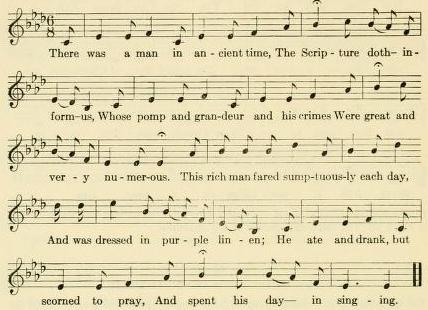The Rich Man and Lazarus- Greer (NC) c. 1915 Brown
[From: The Brown Collection of NC Folklore; 1952. Isaac Garfield (I. G. or “Ike”) Greer (1881-1967) was born in the Zionville community of Watauga County, North Carolina. He served as a history and government professor at Appalachian State Teacher’s College (the precursor to Appalachian State University) from 1910 to 1932. Dr. Greer was one of the earliest collectors of northwestern North Carolina folk songs, with texts primarily acquired from the counties of Ashe, Wilkes, and his native Watauga. In addition to his avid collecting of regional folk songs, Dr. Greer frequently performed the very ballads he collected (resulting in both a commercial recording on the Paramount label and several recordings for the Archive of American Folk Song by the Library of Congress Division of Music). His vocal renditions were often accompanied by his dulcimer playing first wife, Willie Spainhour Greer. Through these persistent scholarly efforts, Dr. Greer emerged as one of the first nationally recognized authorities on mountain folk music. [I.G. Greer Folksong Collection]
A correction (in blue), last word 1st stanza, was made on the original document that was not noted in the Brown Collection.
R. Matteson 2012]
54. Dives and Lazarus 1
This version of the Biblical story, known also in Virginia (TBV 175-6) and Tennessee (SharpK 11 29, SFLQ li 67-8), is not — as Barry (BFSSNE I 12) pointed out— a text of the old English carol of the same title but a later and independent versifying of the Bible story. Copies so far reported agree so closely as to suggest a printed source, but no such source has been found.
'The Rich Man and Lazarus.' Reported by I. G. Greer of Boone, Watauga county; not dated, but about 1915- 16.
1. There was a man in ancient times,
The scripture doth inform us,
Whose pomp and grandeur and whose crimes
Were great and very numerous.
This rich man fared sumptuously each day
And was dressed in purple fine linen;
He ate and drank, but scorned to pray,
And spent his day in singing. [sinning]
A poor man lay at the rich man's gate,
To help himself unable,
And there he lay to humbly wait
For the crumbs from his rich table.
But not one crumb would this happy cure (epicure)*
Ever aye pretend to send him.
The dogs took pity and licked his sores,
More ready to befriend him.
This poor man died at the rich man's gate,
Where angel bands attended;
Straightway to Abraham's bosom flown,
Where all his sorrows ended.
The rich man died and was buried too,
But oh, his dreadful station;
With Abraham and Lazarus both in view
He landed in damnation.
He cried: 'O father Abraham,
Send Lazarus with cold water,
For I'm tormented in these flames,
With these tormenting tortures.'
Says Abraham: 'Son, remember well.
You once did God inherit.
But now at last your doom's in hell
Because you would not cherish.'
* The spelling "happy cure" is so glossed also in the SharpK text.
_______________
54. Dives and Lazarus I [Music from Vol. 4]
'The Rich Man and Lazarus.' Sung by Dr. L G. Greer. Recorded as MS score at Boone, no date, but about 1915-16. The text is almost identical with that of SharpK 11 29, No. 84A ; the tune, however, is different from either of the versions given there.

For melodic relationship cf. **DESO 48, No. 31; to a lesser degree, ibid. 27, No. II.
Scale: Hexatonic (3), plagal. Tonal Center: e-flat. Structure: aba1b1cb1a1b1
(2,2,2,2,2,2,2,2) = aa1ba1 (4,4,4,4) = Reprisenbar.